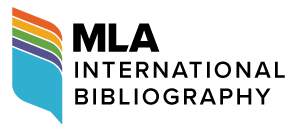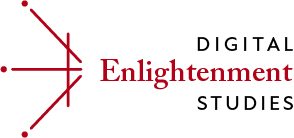Submissions
About
Digital Enlightenment Studies (DES) is an open-access, international, peer-reviewed online scholarly journal published by the Voltaire Foundation (University of Oxford), dedicated to the application and exploration of new digital methodologies and resources for the interdisciplinary field of eighteenth-century studies.
Focus and Scope
Over the past decade, if not longer, digital humanities approaches to eighteenth-century studies have become more conspicuous as a distinct field of research. A growing number of projects, academic positions and curricula are strongly connected with digital studies in the Enlightenment, which have already gained considerable visibility and institutional purchase in the form of conferences, thematic volumes and published monographs. This ongoing development is supported by the rising number and quality of digitally available literary and historical eighteenth-century text collections and bibliographical databases, as well as by recent developments in computational methods for text analysis.
The launch of DES responds to this increasing availability of digitised and born-digital resources for the study of the Enlightenment and the transnational eighteenth-century Republic of Letters. The journal provides a publishing platform for various kinds of scholarship: from long-form articles to shorter notes, works-in-progress, project reports and reviews, all of which touch upon the development, application and critique of digital approaches to the Enlightenment in the broadest sense. It welcomes contributions from both early career and more established scholars in areas such as digital editions, building and exploiting corpora, database construction, linked open data, domain adaptation of methods, operationalisation of concepts, text annotation, and the interpretability, transparency and reproducibility of results. DES encourages submissions addressing all aspects of eighteenth-century studies approached using digital methods, as well as new eighteenth-century digital resources.
Building on the Voltaire Foundation’s long-established tradition, DES accepts work in either English or French, which in no way limits content to the francophone and anglophone spheres of Enlightenment. On the contrary, DES recognises the linguistic and geographic diversity of eighteenth-century studies and encourages scholars of all literatures and cultures to consider submissions. DES is published using open science standards to deliver journal content and peer-reviewed articles together with the code and data on which they rely.
Editors
Nicholas Cronk, Alison Oliver, Gillian Pink, Glenn Roe
Editorial Board
Gregory BrownSimon Burrows
Melanie Conroy
Clovis Gladstone
Roman Kuhn
Katherine McDonough
Alicia Montoya
Gemma Tidman
Mikko Tolonen
Submission Checklist
- The submission has not been previously published, nor is it before another journal for consideration (or an explanation has been provided in Comments to the Editor).
- Any third-party-owned materials used have been identified with appropriate credit lines, and permission obtained from the copyright holder for publication in this journal.
- The submission file is in OpenOffice, Microsoft Word, RTF, or WordPerfect document file format. Please do not submit your article as a PDF.
- All DOIs for the references have been provided, when available.
- Tables and figures are all cited in the text. Tables are included within the text document, whilst figure files are uploaded as supplementary files.
- All tables and figures must have captions within the text. All supplementary files must be labelled (Figure 1, Figure 2, etc).
- Figures/images have a resolution of at least 150dpi (300dpi or above preferred). Each file is no more than 20MB per file. The files are in one of the following formats: JPG, TIFF, GIF, PNG, EPS (to maximise quality, the original source file is preferred).
- The text adheres to the stylistic and bibliographic requirements outlined in the Author Guidelines.
- Please ensure that your article includes a competing interest statement in accordance with our guide on how to declare competing interests.
- Every effort has been made to ensure that author names are removed from the manuscript (read our guide on ensuring an anonymous review).
Copyright Notice
Authors who publish with this journal agree to the following terms:
Authors retain copyright and grant the journal right of first publication with the work simultaneously licensed under a Creative Commons Attribution License that allows others to share the work with an acknowledgement of the work's authorship and initial publication in this journal.
Authors are able to enter into separate, additional contractual arrangements for the non-exclusive distribution of the journal's published version of the work (e.g., post it to an institutional repository or publish it in a book), with an acknowledgement of its initial publication in this journal.
Authors are permitted and encouraged to post their work online (e.g., in institutional repositories or on their website) prior to and during the submission process, as it can lead to productive exchanges, as well as earlier and greater citation of published work (See The Effect of Open Access).
Peer Review
This journal operates a double anonymous peer review policy for main articles.
Ensuring a Blind Review
To ensure the integrity of the blind peer-review for submission to this journal, every effort should be made to prevent the identities of the authors and reviewers from being known to each other. This involves the authors, editors and reviewers (who upload documents as part of their review) checking to see if the following steps have been taken with regard to the text and the file properties:
- Insofar as possible, avoid identifying yourself as the author when citing previous publications.
- With Microsoft Office documents, author identification should also be removed from the properties for the file.
Declaring Competing Interests
For Authors
Please place the competing interests section at the end of the manuscript, immediately before the reference list. The author's initials should be used to denote differing competing interests. For example:
'TW completed paid consultancy work from [company name] as part of the data acquisition for this study. BH has minority shares in [company name], which part funded the research grant for this project. SM is a member of the editorial board for [journal name], which is on a voluntary basis. All other authors have no competing interests.'
If there are no competing interests, please add the below statement:
'The authors declare that they have no competing interests.'
For Reviewers
If you have any competing interests, please list them in the text box available on your reviewer page. For example:
'I was previously employed by the laboratory that collected this data.'
If you do not have competing interests, please add the below statement:
'I have no competing interests to declare.'
Licences
Digital Enlightenment Studies allows the following licences for submission:
- CC BY 4.0
Attribution — You must give appropriate credit, provide a link to the license, and indicate if changes were made. You may do so in any reasonable manner, but not in any way that suggests the licensor endorses you or your use. No additional restrictions — You may not apply legal terms or technological measures that legally restrict others from doing anything the license permits. Texte en français ici : https://creativecommons.org/licenses/by/4.0/deed.fr - CC BY-NC 4.0
Attribution — You must give appropriate credit, provide a link to the license, and indicate if changes were made. You may do so in any reasonable manner, but not in any way that suggests the licensor endorses you or your use. NonCommercial — You may not use the material for commercial purposes. No additional restrictions — You may not apply legal terms or technological measures that legally restrict others from doing anything the license permits. Texte en français ici : https://creativecommons.org/licenses/by-nc/4.0/deed.fr
Open Access Statement
Digital Enlightenment Studies is a fully open access journal and all content is freely available. There is no article publishing charge for authors and all articles are published under a Creative Commons CC BY licence. The journal is published on the Open Library of the Humanities platform.
Publication Cycle
This journal publishes in one issue every year and in occasional special issues.
Sections
Public Submissions
Peer Reviewed
Indexed
Article
Project report
Review
Abstracting and Indexing
Digital Enlightenment Studies is abstracted and indexed in the MLA International Bibliography.
